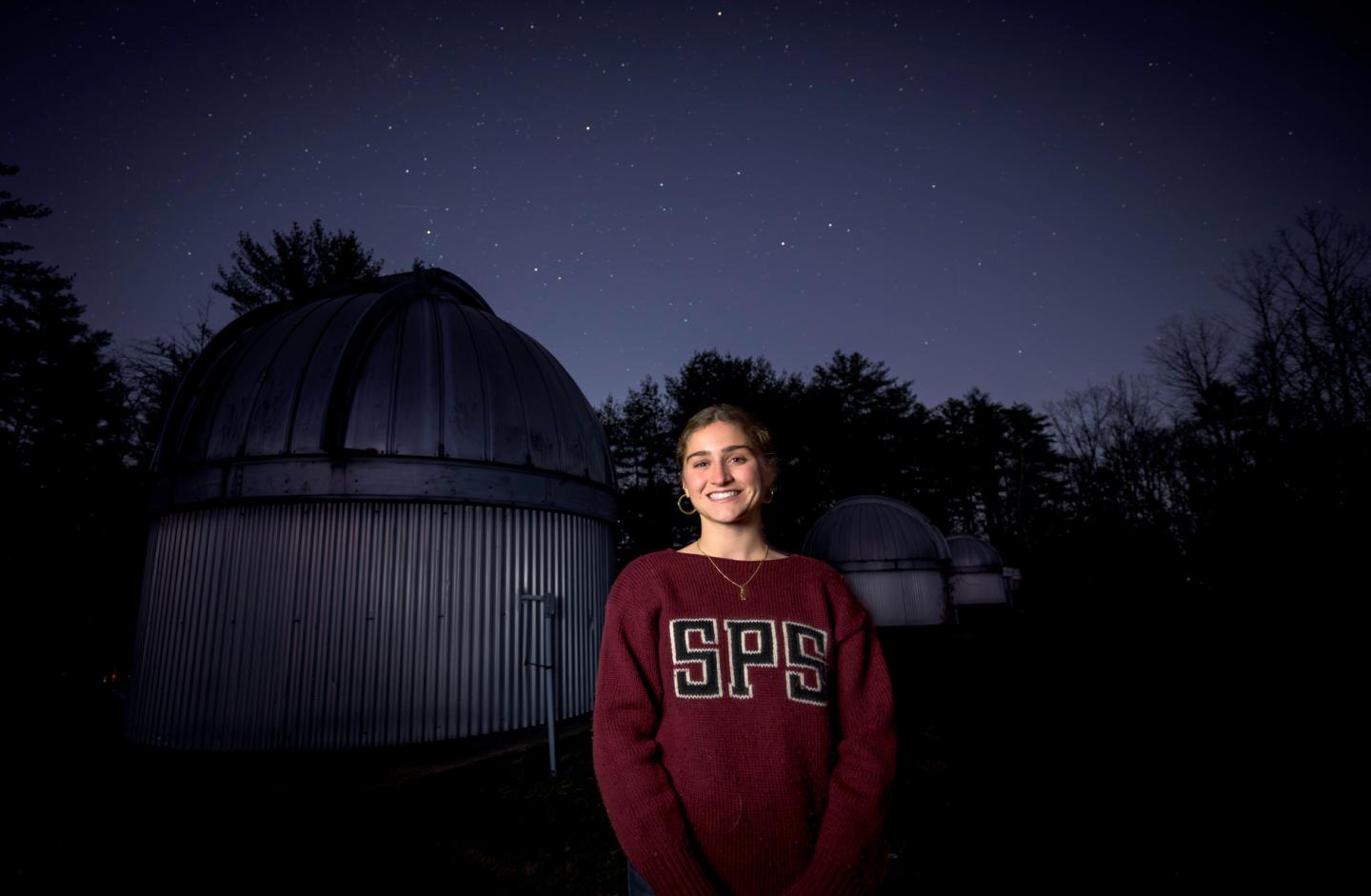

Emerson Bentley ’25 loves outer space — and loves sharing her passion for the subject with others.
BY IAN ALDRICH
As an elementary school student, Emerson Bentley ’25 became obsessed with the idea of outer space. She read books about the subject, watched documentaries and combed through YouTube for videos about astrophysics and astronomy. There were backyard stargazing sessions with her father and bigger family trips with her family to remote areas of California and Wyoming where they could take in the wide-open sky.
“We’d venture out on some hiking trip to the middle of nowhere to watch a meteor shower and it was just so cool,” she says. “It was so peaceful and there is something beautiful about looking up and trying to understand your place in the universe. It’s very calming.”
When Bentley began work in the SPS Applied Science and Engineering Program (ASEP), there was no question about the topic she’d explore. The project-based STEM curriculum had first come to her attention a few years before when her older brother Sam ’24 embarked on an ASEP project that landed him at MIT for neurological research. The depth of work, the setting, and the research that followed after Sam returned from his externship excited Bentley. “I knew right away it was something I wanted to do,” she says.
Bentley’s externship brought her to an unexpected place: Dahlonega, Georgia, home to the University of North Georgia, where she worked closely with Gregory Feiden, an associate professor and the director of school’s astronomical observatory. Feiden, who had been a doctoral student at Dartmouth College along with SPS Physics and Astronomy Teacher Seth Cohen, immersed Bentley into his work modeling the evolutionary life of stars.
Hers was a unique ASEP experience, says Bentley, in that rather than being part of bigger group of college or graduate students, she largely worked one-on-one with Feiden, analyzing the computer modeling of stellar mechanics and poring over the findings with her mentor.
“It wasn’t just me helping him out with his research,” she says. “I was thrown into the deep end.” She laughs. “I got there and he said, ‘You’re doing this,’ which is was super exciting. Part of the day was just meeting with him for two hours in the morning and then in the afternoon I’d attend his undergraduate class.”
One of the unexpected benefits of the externship, says Bentley, was the chance to learn computer programming. “I hadn’t taken into account just how much computers are involved in a career in astronomy or astrophysics,” she says. “I’d never taken a class before in coding but again I was dropped right into it and I’m really thankful that.”
In the months since she’s returned from Georgia, Bentley’s ASEP work on stellar evolutionary modeling has continued. When she talks about her work, Bentley speaks in clear, understandable language. Wipe away the complex physics and complicated math, she says, and what astronomy can present is a deeper understanding of what’s above us and our place in a vast and beautiful universe.
“For me it’s comforting to know that we’re just this tiny blip in the universe,” she says. “That whatever kind of stress I feel for a math test or anything else doesn’t matter in the grand scheme of things. We are just a tiny little population on this tiny little planet, Earth, orbiting around a very average star in a galaxy that is one of many, many galaxies in a universe that we know very little about. That puts a lot of things in perspective.”
Since March, Bentley has been sharing her perspective on the stars and the universe on the podcast, Space Babble, which she co-hosts with fellow SPS students Elle Ruminski ’26 and Thomas Armstrong ’26. Released every three weeks, the show mixes introductory topics with the hosts’ own particular passions, from black holes to the universe’s early beginnings. In advance of last April’s solar eclipse, for example, the team did an explainer of the event and what it meant.
Bentley loves doing the show, and not just because she gets to talk about space. In trying to understand how to discuss these complex topics, she says, she understands them better. That in turn not only ups her game as a student but also allows her to find new and different ways to get others excited about outer space.
“I think it can kind of be an intimidating subject sometimes. In ASEP we give presentations, and people have at least a basic understanding of what cancer is,” she says, referencing a subject on which there is typically one or more projects every year. “But most people don’t know about stellar evolution. And when you don’t have a background in it, it can be kind of intimidating to pop into the field. But it doesn’t have to be that way and our mission is to make complicated subjects accessible to our listeners.”
As Bentley thinks about her future, she says she has no intention of slowing down on her own learning. She’s considering studying astrophysics in college and if the years break the way she hopes they can, she’d like to pursue a career as an astronaut.
“I love school and I love learning new things,” she says. “And I know I want to keep doing stuff with space. There’s so much that we don’t know and that really excites me.”



